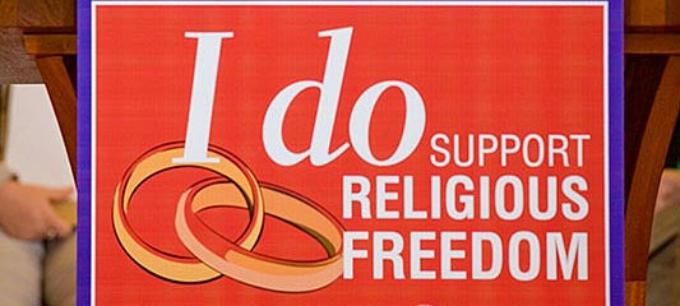
Culture
This faith's god is a jealous god, requiring suppression of those who disagree -- even if the right to disagree was protected by law and Constitution in the Dark Ages (the period before, say, 2010).

Doerflinger
"Leaked Draft of Trump's Religious Freedom Order Reveals Sweeping Plans to Legalize Discrimination," announced The Nation on Feb. 1.
This liberal magazine said legal experts find the draft "sweeping" and "staggering" in allowing religious believers to ignore federal laws. Among their charges are these:
First, the draft defines "religious exercise" as an act or refusal to act motivated by sincerely held religious belief, "whether or not the act is required or compelled by, or central to, a system of religious belief."
One expert told The Nation that current law may not allow the president to implement such "very sweeping" protection.
Second, it covers "any organization, including closely held for-profit corporations." By contrast, President Barack Obama's contraceptive mandate chiefly exempted "houses of worship."
Third, it protects a right to speak and act in accord with one's belief that marriage is a union of one man and one woman, that sexual relations should be within marriage, that "male" and "female" refer to a person's biological sex and that human life begins at conception and merits respect.
Critics say this protects one narrow class of religious belief, violating the Constitution's ban on "establishment" of religion.
It is uncertain whether President Donald Trump will issue this or any similar executive order. But what about these charges against the leaked draft?
First, some background. While the First Amendment protects the "free exercise" of religion, in 1990 a U.S. Supreme Court ruling made the amendment less helpful to religious believers burdened by a "generally applicable" law.
So in 1993, Congress passed the Religious Freedom Restoration Act. It was sponsored by then-Representative Chuck Schumer (now the leading Senate Democrat), approved almost unanimously by Congress (with a Senate vote of 97-3), and enthusiastically signed by President Bill Clinton.
In 2000, a bill to strengthen that law passed Congress without objection and was also signed by Clinton.
Does the draft order abandon the Religious Freedom Restoration Act's bipartisan consensus in favor of partisan bias?
Well, its definition of religious exercise is taken from the Religious Freedom Restoration Act, which protects "any exercise of religion, whether or not compelled by, or central to, a system of religious belief." The act says this protection should be construed broadly.
Similarly, protecting "closely held corporations" owned by religious believers is required by the act, according to the Supreme Court's Hobby Lobby ruling. To fail to protect them would violate the Religious Freedom Restoration Act.
Finally, federal law has many exemptions on particular issues, whether that be military service, abortion, contraception or capital punishment.
As with those issues, traditional views on marriage and sex are not confined to any one religion -- some of them were held until five years ago by Obama and other Democratic leaders. And the draft order says religious freedom "is guaranteed to persons of all faiths."
In short, the draft is under attack for taking "care that the laws be faithfully executed" as the Constitution requires all presidents to do.
The real basis for such attacks is the rise of what Mary Eberstadt's recent book, "It's Dangerous to Believe," calls a new faith: "a quasi-religious faith in the developing secularist catechism about the sexual revolution."
This faith's god is a jealous god, requiring suppression of those who disagree -- even if the right to disagree was protected by law and Constitution in the Dark Ages (the period before, say, 2010).
Besides urging believers to defend their freedom, Eberstadt asks secular liberals to remember values once essential to their own creed: diversity, pluralism and "live and let live."
We can "agree to disagree," she says, without being disagreeable. Supporting proposals like this executive order would be one place to start.
To urge the president to protect religious freedom, visit www.votervoice.net/USCCB/campaigns/49640/respond.
- Richard Doerflinger worked for 36 years in the Secretariat of Pro-Life Activities of the U.S. Conference of Catholic Bishops. He writes from Washington state.
Recent articles in the Culture & Events section
-
'Dignitas' and the mediaRussell Shaw
-
Scripture Reflection for April 14, 2024, Third Sunday of EasterDeacon Greg Kandra
-
St. Helena's House is established in the South EndThomas Lester
-
Is this synodality?Russell Shaw
-
Poking the hornet's nest of IVFFather Tadeusz Pacholczyk


















